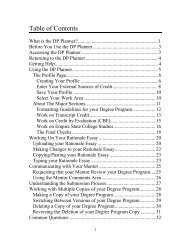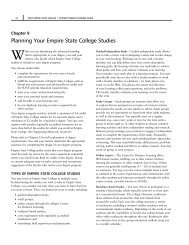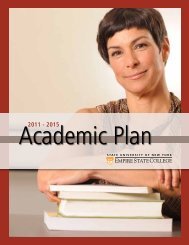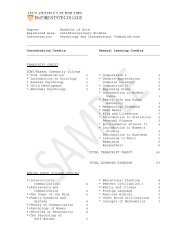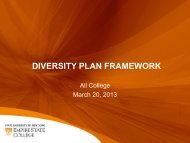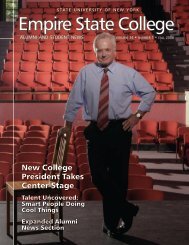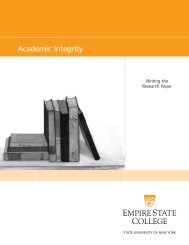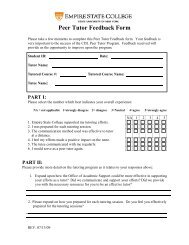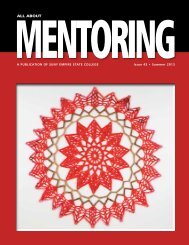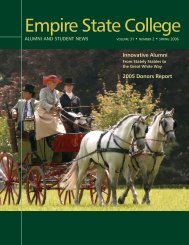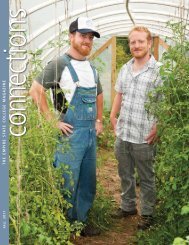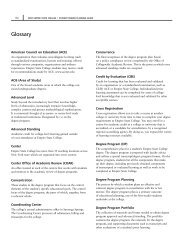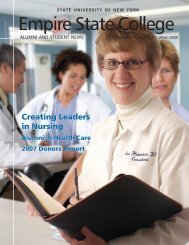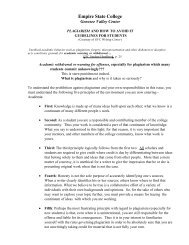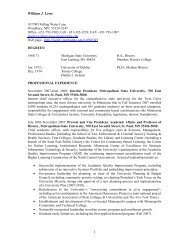All About Mentoring Spring 2011 - SUNY Empire State College
All About Mentoring Spring 2011 - SUNY Empire State College
All About Mentoring Spring 2011 - SUNY Empire State College
Create successful ePaper yourself
Turn your PDF publications into a flip-book with our unique Google optimized e-Paper software.
74<br />
imagination-based thinking is needed the<br />
most. If we lose this opportunity, we could<br />
be turning our backs on possibilities –<br />
possibilities that offer hope for the future.<br />
Like many of the book’s contributors,<br />
I remember the moment I met Maxine<br />
Greene. I was a doctoral student making one<br />
of my first presentations at the American<br />
Educational Studies Association Conference<br />
in Miami, and Lois Weis, my advisor,<br />
invited Greene to come to our presentation.<br />
As usual, she was dressed in black, sitting<br />
in her wheelchair with dozens of people<br />
approaching her to say hello and shake her<br />
hand. I remember being star struck as I had<br />
recently read The Dialectic of Freedom and<br />
thought she was one of the most intelligent<br />
people I had ever read. While much of her<br />
work is conceptual, it has a humanness<br />
about it that offers hope and encourages us<br />
to trust that equitable education is possible.<br />
Greene showed what I knew to recognize as<br />
her down-to-earth self as she commended<br />
us on the work we were doing and gave<br />
us points to consider as we pursued our<br />
research on marginalized populations. It<br />
was evident that she cared about our little<br />
presentation despite her legendary status and<br />
obvious professional clout.<br />
My recollection of this act leads me to a<br />
final reflection inspired by Letters.<br />
It is no coincidence that I cited Nel<br />
Noddings earlier in this piece – Noddings<br />
has done a lot of great work with teachers<br />
and the notion of “caring.” Currently, the<br />
M.A.T. program is working on accreditation<br />
through an organization called TEAC<br />
(Teacher Education Accreditation Council).<br />
The program needs to demonstrate evidence<br />
that our students – now teachers – have<br />
achieved competence in three areas: “content<br />
knowledge, pedagogical knowledge, and<br />
caring teaching skills.” <strong>All</strong> three components<br />
are essential in a quality teacher, but I<br />
cannot help but think that if a teacher didn’t<br />
care, nothing else would matter. Caring<br />
teachers should be willing to give their<br />
students a space to pursue freedom in their<br />
learning by being creative and thoughtful.<br />
This is one key ingredient in building the<br />
democratic community that Maxine Greene<br />
envisioned. We need to remember Greene’s<br />
words of hope and creativity that may allow<br />
us to conceive of a future with educational<br />
innovations that support social justice and<br />
excellence for all. In this time of great need<br />
for creative and innovative thought, let us<br />
not turn away from the music.<br />
References<br />
Cage, J. (1983). Composition in retrospect.<br />
Middletown, CT: Wesleyan University<br />
Press.<br />
Lake, R. (Ed.). (2010). Dear Maxine: Letters<br />
from the unfinished conversation<br />
with Maxine Greene. New York, NY:<br />
Teachers <strong>College</strong> Press.<br />
“For many reasons, the writing of life narratives is likely to remain central to<br />
the practice of adult learning. They are important and effective in multiple ways.<br />
There must, however, be room in our practices for narratives that are jarring,<br />
unsatisfying, and/or structurally and emotionally jagged. … [W]e must allow<br />
stories that acknowledge how a life can be messed up in ways that are not only<br />
apparent, or how an attempt to break away from the constraints of the past is<br />
only partially successful, as I believe it always is.”<br />
Elana Michelson, “Autobiography and Selfhood in the Practice of Adult<br />
Learning,” Adult Educational Quarterly, 61(1), February <strong>2011</strong>, p. 18<br />
suny empire state college • all about mentoring • issue 39 • spring <strong>2011</strong>



